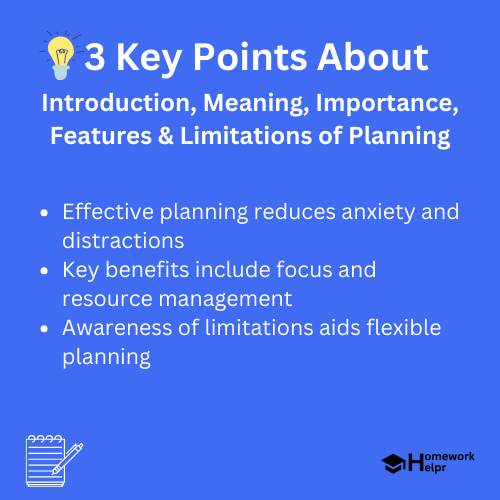📝 Summary
Planning is a critical process in both personal and professional settings, involving setting objectives and organizing actions to achieve them. It encompasses the identification of goals, evaluating resources, and developing structured approaches. The importance of planning lies in maintaining focus, effective resource management, risk management, and measuring progress. Effective plans are goal-oriented, flexible, comprehensive, and timely. However, planning has limitations such as inflexibility, being time-consuming, over-planning, and unpredictability. Understanding these aspects enhances decision-making and reduces anxiety in achieving goals.
Introduction
Planning is one of the most critical processes in both personal and professional life. It involves setting objectives and defining actions to achieve those objectives efficiently. Whether it’s for a school project, a career, or day-to-day activities, effective planning can lead to better outcomes and reduce anxiety.
Meaning
At its core, planning is the process of thinking about and organizing the activities required to achieve a desired goal. It encompasses the identification of goals, the evaluation of available resources, and the development of a structured approach to reach those goals. Planning answers the essential questions of “what,” “how,” and “when” in relation to achieving objectives.
Definition
Definition: The process of formulating steps and making decisions to reach a specific goal.
Examples
For instance, if a student wants to get an A in their science class, they may plan a study schedule that includes daily reviews of material and weekly quizzes.
Importance
Planning holds immense importance in various aspects of life, including education, business, and personal development. Some key reasons why planning is vital include:
- Focus: Planning helps maintain focus on the goals, preventing distractions.
- Resource Management: It allows for effective allocation of resources, including time, money, and manpower.
- Risk Management: By anticipating issues, one can devise backup plans, reducing potential risks.
- Measurement of Progress: A clear plan provides benchmarks against which progress can be measured.
In summary, planning acts as a roadmap, guiding one towards their desired path and ensuring that resources are used effectively.
Features of Planning
Effective planning is characterized by several key features that enhance its efficacy. These include:
- Goal-Oriented: Every plan is directed towards achieving specific goals.
- Flexible: Plans should adapt to changing circumstances without losing focus.
- Comprehensive: A good plan considers all aspects and provides a holistic view of the tasks required.
- Timely: Timelines in planning help ensure tasks are completed on schedule, preventing last-minute rushes.
These features empower individuals and organizations to work systematically toward their objectives, making planning an indispensable tool.
Limitations of Planning
While planning has numerous benefits, it’s crucial to acknowledge its limitations. Some challenges associated with planning include:
- Inflexibility: An overly rigid plan can hinder adaptation to unforeseen circumstances.
- Time-Consuming: Crafting detailed plans can sometimes take more time than executing the task itself.
- Over-Planning: Excessive planning may lead to what is known as “analysis paralysis,” where one becomes stuck in indecision.
- Unpredictability: External factors, such as economic changes or personal emergencies, can render plans ineffective.
Awareness of these limitations allows individuals to create flexible plans which can accommodate unforeseen changes and challenges.
❓Did You Know?
Did you know that the process of planning dates back thousands of years? The ancient Egyptians used meticulous planning to build their great pyramids!
Conclusion
In conclusion, planning is an intricate but vital aspect of achieving goals across various fields. By understanding its meaning, realizing its importance, recognizing its features, and being aware of its limitations, students and individuals can leverage planning to their advantage. Ultimately, effective planning not only leads to success but also fosters a sense of control and reduces uncertainties in both personal and academic life.

Related Questions on Introduction, Meaning, Importance, Features & Limitations of Planning
What is the definition of planning?
Answer: It is formulating steps to reach specific goals.
Why is planning important?
Answer: It helps maintain focus and manage resources.
What are key features of effective planning?
Answer: It is goal-oriented, flexible, and timely.
What limitations does planning have?
Answer: Inflexibility and time consumption can hinder effectiveness.
